ARTICLE AD BOX

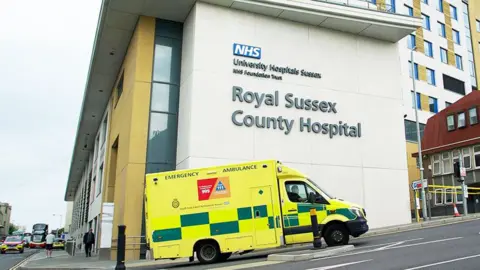 Mark Norman / BBC
Mark Norman / BBC
A police investigation into allegations of preventable deaths and injuries at an NHS trust has doubled the number of cases it is looking at, BBC News can reveal.
The claims centre on care and treatment provided by University Hospitals Sussex NHS Trust between 2015 and 2021.
Sussex Police started looking in 2023 into an initial 105 cases, but BBC File On 4 Investigates has learned that number is now more than 200.
The force says the investigation is "active and ongoing", but it will "not be providing specific details around case numbers at this time".
Police became involved after two whistleblowers raised allegations of medical negligence at two of the trust's departments - neurosurgery and general surgery, including concerns about at least 40 deaths.
The increase in cases is linked to more families having contacted the police.
Separate to this investigation, we have spoken to the family of a patient who allege they were "lied" to by a senior surgeon in the trust's general surgery department, before he carried out an operation that left her with life-threatening injuries.
Wendy Gibbs, 80, had been due to be operated on by Marc Lamah to repair a pelvic prolapse at a private hospital in Brighton, run by Nuffield Health. But the surgeon told her he wanted to switch the procedure to a different Nuffield hospital because the Brighton site didn't have a specific type of scanner that he would need. The machine, it turned out, was also not available at the second hospital.
Mr Lamah also failed to disclose to Mrs Gibbs that he, and other surgeons, were prevented from carrying out such operations in Brighton at the time, as Nuffield Health had suspended that type of surgery over safety concerns.

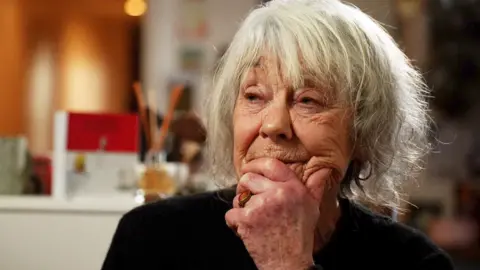
Surgeon Marc Lamah "failed me, he betrayed my trust", says Wendy Gibbs
When Mrs Gibbs' operation happened in March 2024, Mr Lamah mistakenly snipped her bowel, causing internal bleeding not spotted for hours. Mrs Gibbs developed sepsis, a life-threatening condition.
She needed an emergency second operation - also carried out by Mr Lamah - at the Royal Sussex County Hospital in Brighton, which is part of the NHS trust under investigation. This was followed by a spell in intensive care and 11 days' sedation.
Mrs Gibbs, who now has a permanent stoma bag, says she was traumatised by the experience. "He failed me, he betrayed my trust. I've got numerous issues left from the operation. Most of my hair fell out. My nails fell off. It's coming back now, but the trauma of it actually happening and not being able to do anything about it - it's not easy."
Wendy Gibbs's case is not part of the police investigation as her treatment occurred after the period the police are looking at.
Nuffield Health - the private healthcare provider at whose hospital the first operation took place - said it was conducting a "deeper investigation into a particular consultant."
It added: "As the investigation is still live, we are unable to comment."
However, a former director of clinical services at Nuffield's Brighton hospital - where Mr Lamah also practised privately - said that in 2023, the company had recognised concerns with his complication rate.
Michael Turner told us data showed that one third of Mr Lamah's patients had experienced a "moderate harm event" (where, for instance, a patient had to be transferred to another hospital or re-admitted) over a 12-month period. Mr Turner said the figure should have been less than 5%.
Three months ago, Michael Turner was dismissed by Nuffield Health for gross misconduct after he used an expletive to describe the actions of a different consultant.
Surgeon 'set himself 45-min limit'
Mr Lamah continues to operate at Royal Sussex County Hospital. The University Hospitals Sussex NHS Trust told us it had audited his NHS data, which showed that his outcomes were within the expected national range.
"If there is any evidence of concerns regarding the care of our NHS patients, then of course we do not hesitate to act," a spokesperson said.

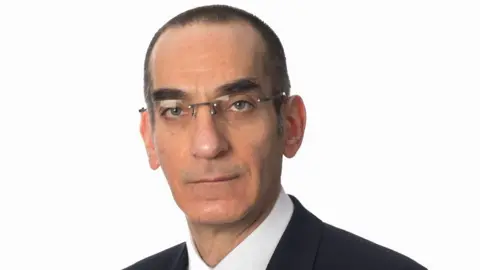
Surgeon Marc Lamah did not provide any comment to the BBC
Speaking anonymously, a former NHS colleague of Mr Lamah told the BBC that the surgeon had been "pulled up on a few occasions for things that were significantly unprofessional".
The colleague says that one of these occasions related to an emergency operation, when Mr Lamah announced he was setting himself a challenge to finish in 45 minutes, despite there being no need to do so.
We contacted Marc Lamah, but he refused to comment.
The BBC has reported a number of stories from the University Hospitals Sussex NHS Trust in the past two years:
Police officers are currently identifying relevant cases and sending them to medical experts for their view as to whether there is a basis to question the care these patients received - a process that's expected to finish in early 2025. The investigation is at an early stage and there are no suspects at this stage.
The majority of cases appear to involve the neurosurgery department. Police are considering gross negligence manslaughter and corporate manslaughter charges.
File on 4 Investigates understands that one of the cases being examined by medical experts as part of the police investigation is that of Stephen Coles. He was operated on by a neurosurgeon named Carl Hardwidge, who spent 31 years working at the trust before leaving in 2023. He has been criticised by the family of Mr Coles, who died in 2021 after being operated on by Mr Hardwidge to remove a brain tumour.

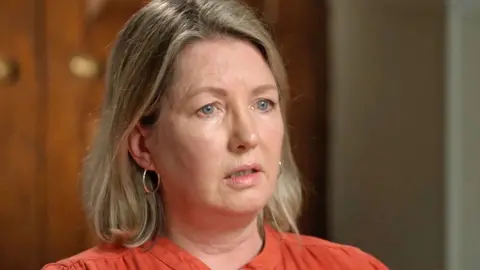
Julie Rhodes says Mr Hardwidge has never explained why her brother, Stephen, was so ill after his operation
Following the surgery, Mr Coles, who was 66, was unable to swallow due to cranial nerve damage. He then spent several weeks in hospital where he eventually died, after contracting pneumonia from poor care he received on a general ward.
His sister, Julie Rhodes, says Mr Hardwidge has never explained to the family why Mr Coles was so ill after his operation. An inquest did not raise any concerns about the care Mr Coles received, a conclusion that left Ms Rhodes "dissatisfied" as it "didn't answer any questions."
However, a neurological expert who assessed the case for BBC News said Stephen Coles' death had been avoidable, and criticised Mr Hardwidge's post-operative care. He said Mr Coles should have been fitted with a tracheostomy to help him breathe.
"The responsibility for protecting the patient's airway," said the expert, "must lie with the operating surgeon."
File on 4 Investigates is aware concerns have been raised about care Carl Hardwidge provided to at least three other patients while working at the trust.
A judge at an employment tribunal also said he was "somewhat concerned" Mr Hardwidge had, during his evidence, tried to minimise delays in the care of another patient who died in 2012.
When File on 4 Investigates contacted Mr Hardwidge, he refused to comment.

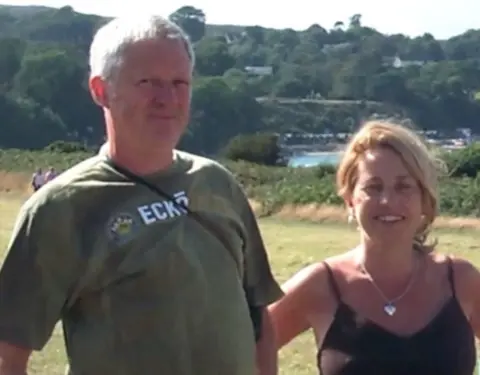 Julie Rhodes
Julie Rhodes
The death of Stephen Coles - pictured with his sister Julie - had been avoidable, according to a neurological expert who assessed his case for BBC News
The University Hospitals Sussex NHS trust said that its neurosurgery team had faced significant challenges since 2012, and that consequently some patients were waiting longer for their care than they should have done, "for which we sincerely apologise".
The trust says it is cooperating with the police investigation and recognise that it has much work to do to improve their performance. In a statement, the chief executive, George Findlay, said that since a new leadership team was installed in 2017, many improvements in quality and safety had followed.
"Despite these and other improvements," added Mr Findlay, "it is clear that some long-standing challenges remain, and it is also absolutely clear that we have much further to go in improving care and better supporting colleagues."

 4 months ago
23
4 months ago
23








 English (US) ·
English (US) ·